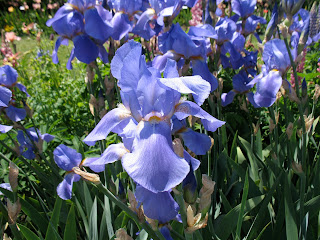 |
| This is taken from Ashley's website. |
Although I should disclose that I haven't finished the book as yet, I have been favorably impressed and moved with what I have read of All That is Bitter and Sweet. Anyone who dismisses this gifted and giving woman out of hand is greatly underestimating her commitment to and eloquent defense of her strongly-held positions. It's also important to note the influence of her difficult and dark childhood upon the positions she holds today. While we may disagree with her on points, her motivations seem to spring from those sorrows, lending a degree of greater credence, I think, to her words.
It's also important to add a warning. I suggest it's all too easy for people--me included--to look very cynically upon the true and substantive humanitarian work done by select celebrities: from George Clooney and Angelina Jolie to Bono. While it's true that with some celebrities it's almost as if they are making amends for their success, soothing their own consciences. Still, I suggest, rather than over-speculation along those lines, it might be more fruitful to endeavor to imitate their good in some small (or great) way--as well as extending the benefit of the doubt with regards to their underlying motivations when possible. We don't, after all, have to agree with someone on every point in order to appreciate the good that is accomplished. Let's thank God the work is getting done, instead of self-righteously complaining about the supposed insincerity of the workers!
Recently, on Ashley Judd's blog she posted a somewhat long-winded essay entitled "The Conversation." (As an aside, her concluding N.B. or "Nota bene" reminds me of Hillaire Belloc's humorous words of warning regarding public thanks in prefaces from in The Path to Rome, but we'll leave further comments on that for another day.) Perhaps not surprisingly...she recently tweeted that she penned the essay in twenty minutes, or so. Not exactly shocking news. While slogging through the text is difficult on account of the overabundance of cliches, popular psychology references, euphemisms, and melodramatic language usage, there is ultimately some meat for the reader to digest--if one can keep at it.
First of all, apparently what enouraged her to write the article in the first place were unkind comments concerning her recent "puffy" appearance offered by members of the media--and others. The comments have indeed been most loathsome--not to mention stupid--and I certainly can agree that there's been a shocking lack of respect and decency in the media...but is this really anything new?
Furthermore, for a member of the "Hollywood Elite" to fault the media with regards to her personal treatment in this context seems problematic to say the least. I am unaware, for example, of this actress standing up for either Catholic or conservative women when they are routinely taken to task for their positions or appearance. What about the case of Bristol Palin? Has Ashley Judd raised her voice in defense of any women with whom she disagrees?
There is also a self-centeredness or complacency apparent within the essay, which I will only lightly touch upon. Suffice to say, she seems to take herself so seriously that it's difficult to draw the same conclusion about her. If a little less were said...it would say a great deal more. In fairness, perhaps the language is unduly influenced by her emotions, but she still should have known better.
The section of her essay that really sparked my desire to share a few rough thoughts today was her opening paragraph quoted below.
The Conversation about women’s bodies exists largely outside of us, while it is also directed at (and marketed to) us, and used to define and control us. The Conversation about women happens everywhere, publicly and privately. We are described and detailed, our faces and bodies analyzed and picked apart, our worth ascertained and ascribed based on the reduction of personhood to simple physical objectification. Our voices, our personhood, our potential, and our accomplishments are regularly minimized and muted.
While I agree with some of the points raised within her essay--e.g. sexualization of children by popular culture--her usage of the word personhood is what really drew my attention. It's an interesting word choice. To those of us within the Pro-Life Movement, at least, the word evokes the fundamental right of the unborn--to be born. (Would it make a difference, Ashley, if we were to simply refer to unborn girls?) Why precisely does one have to be born to be endowed with personhood?
When we learn someday the full magnitude of the evil of abortion, I fear many of us are in for a rude awakening. It's time to stop sacrificing our children on the altar of Molech. You, Ashley, recognize the value of children and the importance of safeguarding them. We agree in shielding the weak from harm...but you turn a blind eye to the unborn. Why this tragic error in logic? Who could be more innocent? What crime have they committed to justify their end? Food for thought--and perhaps a conversation, or two.
